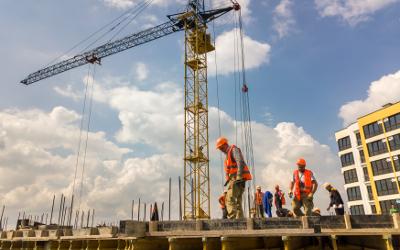OU academics call for more sustainable building regulations

OU experts have called for greater sustainability in new buildings’ construction, which is responsible for 10% of all carbon emissions globally.
Dr Alice Moncaster and PhD student Jane Anderson, international experts in reducing carbon emissions through construction, have provided evidence for a Select Committee report (published 26 May 2022) that they have hailed as ‘the first major step towards tackling new building emissions.’
Currently, regulations require new buildings and major refurbishments of existing buildings to be energy efficient, limiting the heating, lighting and cooling energy use.
Requirements for energy efficiency have been increasing over the last two decades, particularly since the 2006 enforcement of the European Energy Performance of Buildings Directive (EPBD).
However, the UK has not achieved its earlier target ‘zero-carbon’ requirement by 2020. Even if it had been, the OU experts argue, the UK’s zero-carbon definition and the EPBD both ignore a significant element of the whole-of-life carbon emissions of a building.
This missing part is a building’s ‘embodied carbon’. These include emissions from manufacturing and transporting building materials, the construction process, repairs and replacements during a building’s lifetime, its ultimate demolition, and its waste disposal.
Dr Moncaster said:
“Ignoring embodied carbon is like budgeting for a car, but only including the running costs of tax and petrol and forgetting to include the cost of buying the car in the first place.
“We can’t do this with money. However, individually we don’t have to pay for embodied carbon costs. Unlike the energy used in heating and lighting, there isn’t a direct connection between the cost of the building materials and their carbon emissions.”
She continued:
“Around 10% of all global carbon emissions come from constructing buildings. Although we don’t pay for it directly, we know now that this embodied carbon is a devastating cost to the planet.”
These overlooked emissions are sometimes called the ‘capital carbon’. However, after years of industry lobbying, research, and methodology development, Dr Moncaster feels that the UK Government is starting to take note, and embodied carbon is a critical element of the latest Inquiry.
Dr Moncaster highlighted the importance of the report and its potential impact:
“The Government has a key role to play in legislating to reduce these construction impacts.
“We hope this report will have significant and hard-hitting consequences for building construction practices, construction materials, and building regulation in the UK.”
A version of this story, written by Laura Bandell, originally appeared on OU News.
You may also be interested in:
- Dr Moncaster’s OpenLearn article on climate change and the built environment.
- Research in the Faculty of Science, Technology, Engineering and Mathematics.
Quarterly Review of Research
Read our Quarterly Review of Research to learn about our latest quality academic output.

Contact our news team
For all out of hours enquiries, please telephone +44 (0)7901 515891
